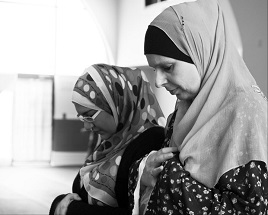Is There Room for Gratitude in an Anxious Brain?

An anxious brain is an active brain, and it can feel that there's only space for anxiety and certainly no room for gratitude. Don't be mistaken; it's not that people living with anxiety don't have gratitude in their heart. Having an anxious brain doesn't mean that someone is cold, uncaring, or ungrateful. Often, the opposite is true: sometimes people experience anxiety such as social anxiety disorder or generalized anxiety disorder because they care a great deal. People living with anxiety do have gratitude in their heart, but it can feel like there's no room for gratitude in an anxious brain (Anxiety: It's In Your Head [Your Brain]). This latter part, though, is a false belief.
Why It Feels Like There's No Room for Gratitude in an Anxious Brain
 Anxiety makes thoughts race. It's a lot like boiling water. Something fuels the fire in the anxious brain. Perhaps that something is external to us, such as a stressor or trigger, or perhaps its internal, some ongoing or obsessive thought or emotion. Either way, the anxiety begins to move as it heats up, faster and faster. The metaphorical bubbles of anxiety grow larger and larger, and they bob and whirl and crash into each other at increasing speeds and intensity. The anxious brain leaves little room for gratitude.
Anxiety makes thoughts race. It's a lot like boiling water. Something fuels the fire in the anxious brain. Perhaps that something is external to us, such as a stressor or trigger, or perhaps its internal, some ongoing or obsessive thought or emotion. Either way, the anxiety begins to move as it heats up, faster and faster. The metaphorical bubbles of anxiety grow larger and larger, and they bob and whirl and crash into each other at increasing speeds and intensity. The anxious brain leaves little room for gratitude.
Really, how is anything supposed to insert itself into that crowded, boiling mess? How can we have thoughts of gratitude when we have this painfully anxious brain? It can seem like there's no room for gratitude when the anxious ones boil and bounce everywhere.
Gratitude Will Make Room for Itself
Picture once again a pot of boiling water. You're making something. The water begins to boil fully, and you pour in whatever it is you're making. Rather than bouncing off the bubbles and flying back out of the pot, whatever you've poured in finds space. Similarly, gratitude finds room for itself in an anxious brain.
This is good news. Anxiety can make us tired and fatigued, and having to fight and push and wiggle one more thing into a very full, anxious brain can seem daunting. Gratitude is a feeling before it's a thought. It can slide around and among the anxious thoughts inside your head and begin to settle in. There truly is room for gratitude in an anxious brain.
Gratitude is indeed a feeling. Once you allow yourself to just be with the feelings, words start to form, and they can exist right along with the anxious thoughts. Gratitude doesn't directly eradicate anxiety. We'd be grateful if it did. What gratitude does is gently, quietly shift our perspective from our anxieties to what is good in our life.
As we work to reduce our anxiety, there is room for gratitude in our anxious brain. Because anxiety can be so overbearing, it can be difficult to help gratitude make room for itself. In the below video, I share a way to help make room for anxiety in an anxious brain.
How do you make room for gratitude?
You can also connect with Tanya J. Peterson on her website, Google+, Facebook, Twitter,Linkedin and Pinterest.
APA Reference
Peterson, T.
(2015, November 26). Is There Room for Gratitude in an Anxious Brain?, HealthyPlace. Retrieved
on 2026, January 19 from https://www.healthyplace.com/blogs/anxiety-schmanxiety/2015/11/room-for-gratitude-in-an-anxious-brain-really
Author: Tanya J. Peterson, MS, NCC, DAIS
Thank you for this article. It was exactly what I needed right now, and I am ever so grateful that you have taken the effort to share this with us all. Thanks again :)
And I'm grateful to you for your input and for the fact that you found this useful!
Simply desire to say your article is as amazing. The clarity in your post is just great and i could assume you're an expert on this subject. Fine with your permission allow me to grab your RSS feed to keep updated with forthcoming post. Thanks a million and please continue the gratifying work.
Hello!
Thank you for your comment! I truly appreciate it. Please feel free to grab the RSS feed if you can. I'd tell you what it is, but I'm not sure what it is. I know what an RSS feed is, but that's about it. I know much more about anxiety and mental health than I do about computer-related things. :) I have a new post every Thursday, if that helps. Hopefully my articles are more helpful than this comment is!
I would like to express my affection for your kind-heartedness supporting those who should have help on your matter. Your special dedication to getting the solution all-around appears to be exceptionally useful and has in every case helped those much like me to achieve their objectives. Your own interesting guideline denotes this much a person like me and further more to my office workers. Many thanks; from each one of us.
Hello Arden,
Thank you so much for your feedback. I'm so happy to know that my information is helpful to you and to your office workers. Thanks to all of you!
To lessen anxiety or GAD, a person must practice gratitude. At first it doesn't seem to work because you are so consumed with what is bothering you. But persistency at gratitude slowly shifts some of that anxiety away. After about 2 years, I am finally feeling somewhat calm. You have to let go of yourself and start looking and talking to others. It is hard, but with time you don't seem to get quite anxious. Medication helps too of course. Thanks for article and we do have a lot to be grateful for.
I love your jar! I try to think of things every day that I'm grateful for, but rarely write them down. But you made me realize that writing it down is important and makes it more solid. Love all your blog posts...thanks for the help.
Hi Sheila,
Thank you! I really appreciate your feedback. I found that using this jar does make my gratitude more solid and the attitude that goes with it more authentic. I hope you like doing this! (And if you miss a day/days, the jar will still be waiting! If I miss, I just pick up right were I left off. The jar won't judge. :) )